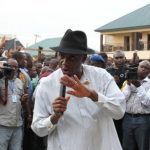Donald Trump cannot find a private company to guarantee the $464m (£365m) he has been ordered to pay in a New York civil fraud case.
The former president must either pay the full amount in cash or secure a bond in order to continue his appeal.
If he is unable to do so by 25 March, he faces the prospect of some of his real estate assets being seized by the state’s attorney general.
Mr Trump said that securing a bond of that size was “practically impossible”.
For a fee, a bonding company would guarantee the full amount to the New York court.
They would then have to pay it if Mr Trump loses his appeal and cannot do so himself.
In his statement, Mr Trump said that the bond he was asked to pay would be “impossible for any company, including one as successful as mine”.
Mr Trump’s team spent “countless hours negotiating with one of the largest insurance companies in the world”, his lawyers wrote in a court filing.
But they concluded that “very few bonding companies will consider a bond of anything approaching that magnitude”.
The lawyers said they had approached 30 companies without success.
To secure a bond, an individual has to demonstrate to the company providing the guarantee that they have enough liquidity – usually in the form of cash plus things like stocks or securities which can be sold quickly – to cover the amount.
Mr Trump’s two eldest sons must also pay millions of dollars in the case.
Along with ordering Mr Trump to pay the penalty, New York Judge Arthur Engoron banned him from running any businesses in the state for three years after he found the former president falsely inflated assets to secure better loan deals.
A judge paused Mr Trump’s business ban last month, but denied his bid to provide a smaller bond amount, $100m, to cover the fine.
In the latest filing, the former president’s lawyers included an affidavit from a president of a private insurance firm, who said that “simply put, a bond of this size is rarely, if ever, seen”.
Mr Trump’s unprecedented legal situation makes it difficult to predict next steps, said former federal prosecutor Diana Florence, who also said that penalties on this scale are usually levied against large companies.
His legal team has been playing a delaying game as he appeals the verdict, she said, but now “he might be out of rope”.
New York’s attorney general gave a 30-day grace period from the ruling to give Mr Trump time to find the money. That expires next Tuesday.
Mr Trump’s lawyers said bond companies would not accept “hard assets such as real estate as collateral” for the bond, but only cash or “cash equivalents”, such as investments that can be quickly liquidated.
According to a Forbes estimate, Mr Trump is worth about $2.6bn. He testified last year that he had $400m in liquid assets.
Donald Trump cannot find a private company to guarantee the $464m (£365m) he has been ordered to pay in a New York civil fraud case.
The former president must either pay the full amount in cash or secure a bond in order to continue his appeal.
If he is unable to do so by 25 March, he faces the prospect of some of his real estate assets being seized by the state’s attorney general.
Mr Trump said that securing a bond of that size was “practically impossible”.
For a fee, a bonding company would guarantee the full amount to the New York court.
They would then have to pay it if Mr Trump loses his appeal and cannot do so himself.
In his statement, Mr Trump said that the bond he was asked to pay would be “impossible for any company, including one as successful as mine”.
Mr Trump’s team spent “countless hours negotiating with one of the largest insurance companies in the world”, his lawyers wrote in a court filing.
But they concluded that “very few bonding companies will consider a bond of anything approaching that magnitude”.
The lawyers said they had approached 30 companies without success.
To secure a bond, an individual has to demonstrate to the company providing the guarantee that they have enough liquidity – usually in the form of cash plus things like stocks or securities which can be sold quickly – to cover the amount.
Mr Trump’s two eldest sons must also pay millions of dollars in the case.
Along with ordering Mr Trump to pay the penalty, New York Judge Arthur Engoron banned him from running any businesses in the state for three years after he found the former president falsely inflated assets to secure better loan deals.
A judge paused Mr Trump’s business ban last month, but denied his bid to provide a smaller bond amount, $100m, to cover the fine.
In the latest filing, the former president’s lawyers included an affidavit from a president of a private insurance firm, who said that “simply put, a bond of this size is rarely, if ever, seen”.
Mr Trump’s unprecedented legal situation makes it difficult to predict next steps, said former federal prosecutor Diana Florence, who also said that penalties on this scale are usually levied against large companies.
His legal team has been playing a delaying game as he appeals the verdict, she said, but now “he might be out of rope”.
New York’s attorney general gave a 30-day grace period from the ruling to give Mr Trump time to find the money. That expires next Tuesday.
Mr Trump’s lawyers said bond companies would not accept “hard assets such as real estate as collateral” for the bond, but only cash or “cash equivalents”, such as investments that can be quickly liquidated.
According to a Forbes estimate, Mr Trump is worth about $2.6bn. He testified last year that he had $400m in liquid assets.
Donald Trump cannot find a private company to guarantee the $464m (£365m) he has been ordered to pay in a New York civil fraud case.
The former president must either pay the full amount in cash or secure a bond in order to continue his appeal.
If he is unable to do so by 25 March, he faces the prospect of some of his real estate assets being seized by the state’s attorney general.
Mr Trump said that securing a bond of that size was “practically impossible”.
For a fee, a bonding company would guarantee the full amount to the New York court.
They would then have to pay it if Mr Trump loses his appeal and cannot do so himself.
In his statement, Mr Trump said that the bond he was asked to pay would be “impossible for any company, including one as successful as mine”.
Mr Trump’s team spent “countless hours negotiating with one of the largest insurance companies in the world”, his lawyers wrote in a court filing.
But they concluded that “very few bonding companies will consider a bond of anything approaching that magnitude”.
The lawyers said they had approached 30 companies without success.
To secure a bond, an individual has to demonstrate to the company providing the guarantee that they have enough liquidity – usually in the form of cash plus things like stocks or securities which can be sold quickly – to cover the amount.
Mr Trump’s two eldest sons must also pay millions of dollars in the case.
Along with ordering Mr Trump to pay the penalty, New York Judge Arthur Engoron banned him from running any businesses in the state for three years after he found the former president falsely inflated assets to secure better loan deals.
A judge paused Mr Trump’s business ban last month, but denied his bid to provide a smaller bond amount, $100m, to cover the fine.
In the latest filing, the former president’s lawyers included an affidavit from a president of a private insurance firm, who said that “simply put, a bond of this size is rarely, if ever, seen”.
Mr Trump’s unprecedented legal situation makes it difficult to predict next steps, said former federal prosecutor Diana Florence, who also said that penalties on this scale are usually levied against large companies.
His legal team has been playing a delaying game as he appeals the verdict, she said, but now “he might be out of rope”.
New York’s attorney general gave a 30-day grace period from the ruling to give Mr Trump time to find the money. That expires next Tuesday.
Mr Trump’s lawyers said bond companies would not accept “hard assets such as real estate as collateral” for the bond, but only cash or “cash equivalents”, such as investments that can be quickly liquidated.
According to a Forbes estimate, Mr Trump is worth about $2.6bn. He testified last year that he had $400m in liquid assets.
Donald Trump cannot find a private company to guarantee the $464m (£365m) he has been ordered to pay in a New York civil fraud case.
The former president must either pay the full amount in cash or secure a bond in order to continue his appeal.
If he is unable to do so by 25 March, he faces the prospect of some of his real estate assets being seized by the state’s attorney general.
Mr Trump said that securing a bond of that size was “practically impossible”.
For a fee, a bonding company would guarantee the full amount to the New York court.
They would then have to pay it if Mr Trump loses his appeal and cannot do so himself.
In his statement, Mr Trump said that the bond he was asked to pay would be “impossible for any company, including one as successful as mine”.
Mr Trump’s team spent “countless hours negotiating with one of the largest insurance companies in the world”, his lawyers wrote in a court filing.
But they concluded that “very few bonding companies will consider a bond of anything approaching that magnitude”.
The lawyers said they had approached 30 companies without success.
To secure a bond, an individual has to demonstrate to the company providing the guarantee that they have enough liquidity – usually in the form of cash plus things like stocks or securities which can be sold quickly – to cover the amount.
Mr Trump’s two eldest sons must also pay millions of dollars in the case.
Along with ordering Mr Trump to pay the penalty, New York Judge Arthur Engoron banned him from running any businesses in the state for three years after he found the former president falsely inflated assets to secure better loan deals.
A judge paused Mr Trump’s business ban last month, but denied his bid to provide a smaller bond amount, $100m, to cover the fine.
In the latest filing, the former president’s lawyers included an affidavit from a president of a private insurance firm, who said that “simply put, a bond of this size is rarely, if ever, seen”.
Mr Trump’s unprecedented legal situation makes it difficult to predict next steps, said former federal prosecutor Diana Florence, who also said that penalties on this scale are usually levied against large companies.
His legal team has been playing a delaying game as he appeals the verdict, she said, but now “he might be out of rope”.
New York’s attorney general gave a 30-day grace period from the ruling to give Mr Trump time to find the money. That expires next Tuesday.
Mr Trump’s lawyers said bond companies would not accept “hard assets such as real estate as collateral” for the bond, but only cash or “cash equivalents”, such as investments that can be quickly liquidated.
According to a Forbes estimate, Mr Trump is worth about $2.6bn. He testified last year that he had $400m in liquid assets.
Donald Trump cannot find a private company to guarantee the $464m (£365m) he has been ordered to pay in a New York civil fraud case.
The former president must either pay the full amount in cash or secure a bond in order to continue his appeal.
If he is unable to do so by 25 March, he faces the prospect of some of his real estate assets being seized by the state’s attorney general.
Mr Trump said that securing a bond of that size was “practically impossible”.
For a fee, a bonding company would guarantee the full amount to the New York court.
They would then have to pay it if Mr Trump loses his appeal and cannot do so himself.
In his statement, Mr Trump said that the bond he was asked to pay would be “impossible for any company, including one as successful as mine”.
Mr Trump’s team spent “countless hours negotiating with one of the largest insurance companies in the world”, his lawyers wrote in a court filing.
But they concluded that “very few bonding companies will consider a bond of anything approaching that magnitude”.
The lawyers said they had approached 30 companies without success.
To secure a bond, an individual has to demonstrate to the company providing the guarantee that they have enough liquidity – usually in the form of cash plus things like stocks or securities which can be sold quickly – to cover the amount.
Mr Trump’s two eldest sons must also pay millions of dollars in the case.
Along with ordering Mr Trump to pay the penalty, New York Judge Arthur Engoron banned him from running any businesses in the state for three years after he found the former president falsely inflated assets to secure better loan deals.
A judge paused Mr Trump’s business ban last month, but denied his bid to provide a smaller bond amount, $100m, to cover the fine.
In the latest filing, the former president’s lawyers included an affidavit from a president of a private insurance firm, who said that “simply put, a bond of this size is rarely, if ever, seen”.
Mr Trump’s unprecedented legal situation makes it difficult to predict next steps, said former federal prosecutor Diana Florence, who also said that penalties on this scale are usually levied against large companies.
His legal team has been playing a delaying game as he appeals the verdict, she said, but now “he might be out of rope”.
New York’s attorney general gave a 30-day grace period from the ruling to give Mr Trump time to find the money. That expires next Tuesday.
Mr Trump’s lawyers said bond companies would not accept “hard assets such as real estate as collateral” for the bond, but only cash or “cash equivalents”, such as investments that can be quickly liquidated.
According to a Forbes estimate, Mr Trump is worth about $2.6bn. He testified last year that he had $400m in liquid assets.
Donald Trump cannot find a private company to guarantee the $464m (£365m) he has been ordered to pay in a New York civil fraud case.
The former president must either pay the full amount in cash or secure a bond in order to continue his appeal.
If he is unable to do so by 25 March, he faces the prospect of some of his real estate assets being seized by the state’s attorney general.
Mr Trump said that securing a bond of that size was “practically impossible”.
For a fee, a bonding company would guarantee the full amount to the New York court.
They would then have to pay it if Mr Trump loses his appeal and cannot do so himself.
In his statement, Mr Trump said that the bond he was asked to pay would be “impossible for any company, including one as successful as mine”.
Mr Trump’s team spent “countless hours negotiating with one of the largest insurance companies in the world”, his lawyers wrote in a court filing.
But they concluded that “very few bonding companies will consider a bond of anything approaching that magnitude”.
The lawyers said they had approached 30 companies without success.
To secure a bond, an individual has to demonstrate to the company providing the guarantee that they have enough liquidity – usually in the form of cash plus things like stocks or securities which can be sold quickly – to cover the amount.
Mr Trump’s two eldest sons must also pay millions of dollars in the case.
Along with ordering Mr Trump to pay the penalty, New York Judge Arthur Engoron banned him from running any businesses in the state for three years after he found the former president falsely inflated assets to secure better loan deals.
A judge paused Mr Trump’s business ban last month, but denied his bid to provide a smaller bond amount, $100m, to cover the fine.
In the latest filing, the former president’s lawyers included an affidavit from a president of a private insurance firm, who said that “simply put, a bond of this size is rarely, if ever, seen”.
Mr Trump’s unprecedented legal situation makes it difficult to predict next steps, said former federal prosecutor Diana Florence, who also said that penalties on this scale are usually levied against large companies.
His legal team has been playing a delaying game as he appeals the verdict, she said, but now “he might be out of rope”.
New York’s attorney general gave a 30-day grace period from the ruling to give Mr Trump time to find the money. That expires next Tuesday.
Mr Trump’s lawyers said bond companies would not accept “hard assets such as real estate as collateral” for the bond, but only cash or “cash equivalents”, such as investments that can be quickly liquidated.
According to a Forbes estimate, Mr Trump is worth about $2.6bn. He testified last year that he had $400m in liquid assets.
Donald Trump cannot find a private company to guarantee the $464m (£365m) he has been ordered to pay in a New York civil fraud case.
The former president must either pay the full amount in cash or secure a bond in order to continue his appeal.
If he is unable to do so by 25 March, he faces the prospect of some of his real estate assets being seized by the state’s attorney general.
Mr Trump said that securing a bond of that size was “practically impossible”.
For a fee, a bonding company would guarantee the full amount to the New York court.
They would then have to pay it if Mr Trump loses his appeal and cannot do so himself.
In his statement, Mr Trump said that the bond he was asked to pay would be “impossible for any company, including one as successful as mine”.
Mr Trump’s team spent “countless hours negotiating with one of the largest insurance companies in the world”, his lawyers wrote in a court filing.
But they concluded that “very few bonding companies will consider a bond of anything approaching that magnitude”.
The lawyers said they had approached 30 companies without success.
To secure a bond, an individual has to demonstrate to the company providing the guarantee that they have enough liquidity – usually in the form of cash plus things like stocks or securities which can be sold quickly – to cover the amount.
Mr Trump’s two eldest sons must also pay millions of dollars in the case.
Along with ordering Mr Trump to pay the penalty, New York Judge Arthur Engoron banned him from running any businesses in the state for three years after he found the former president falsely inflated assets to secure better loan deals.
A judge paused Mr Trump’s business ban last month, but denied his bid to provide a smaller bond amount, $100m, to cover the fine.
In the latest filing, the former president’s lawyers included an affidavit from a president of a private insurance firm, who said that “simply put, a bond of this size is rarely, if ever, seen”.
Mr Trump’s unprecedented legal situation makes it difficult to predict next steps, said former federal prosecutor Diana Florence, who also said that penalties on this scale are usually levied against large companies.
His legal team has been playing a delaying game as he appeals the verdict, she said, but now “he might be out of rope”.
New York’s attorney general gave a 30-day grace period from the ruling to give Mr Trump time to find the money. That expires next Tuesday.
Mr Trump’s lawyers said bond companies would not accept “hard assets such as real estate as collateral” for the bond, but only cash or “cash equivalents”, such as investments that can be quickly liquidated.
According to a Forbes estimate, Mr Trump is worth about $2.6bn. He testified last year that he had $400m in liquid assets.
Donald Trump cannot find a private company to guarantee the $464m (£365m) he has been ordered to pay in a New York civil fraud case.
The former president must either pay the full amount in cash or secure a bond in order to continue his appeal.
If he is unable to do so by 25 March, he faces the prospect of some of his real estate assets being seized by the state’s attorney general.
Mr Trump said that securing a bond of that size was “practically impossible”.
For a fee, a bonding company would guarantee the full amount to the New York court.
They would then have to pay it if Mr Trump loses his appeal and cannot do so himself.
In his statement, Mr Trump said that the bond he was asked to pay would be “impossible for any company, including one as successful as mine”.
Mr Trump’s team spent “countless hours negotiating with one of the largest insurance companies in the world”, his lawyers wrote in a court filing.
But they concluded that “very few bonding companies will consider a bond of anything approaching that magnitude”.
The lawyers said they had approached 30 companies without success.
To secure a bond, an individual has to demonstrate to the company providing the guarantee that they have enough liquidity – usually in the form of cash plus things like stocks or securities which can be sold quickly – to cover the amount.
Mr Trump’s two eldest sons must also pay millions of dollars in the case.
Along with ordering Mr Trump to pay the penalty, New York Judge Arthur Engoron banned him from running any businesses in the state for three years after he found the former president falsely inflated assets to secure better loan deals.
A judge paused Mr Trump’s business ban last month, but denied his bid to provide a smaller bond amount, $100m, to cover the fine.
In the latest filing, the former president’s lawyers included an affidavit from a president of a private insurance firm, who said that “simply put, a bond of this size is rarely, if ever, seen”.
Mr Trump’s unprecedented legal situation makes it difficult to predict next steps, said former federal prosecutor Diana Florence, who also said that penalties on this scale are usually levied against large companies.
His legal team has been playing a delaying game as he appeals the verdict, she said, but now “he might be out of rope”.
New York’s attorney general gave a 30-day grace period from the ruling to give Mr Trump time to find the money. That expires next Tuesday.
Mr Trump’s lawyers said bond companies would not accept “hard assets such as real estate as collateral” for the bond, but only cash or “cash equivalents”, such as investments that can be quickly liquidated.
According to a Forbes estimate, Mr Trump is worth about $2.6bn. He testified last year that he had $400m in liquid assets.














